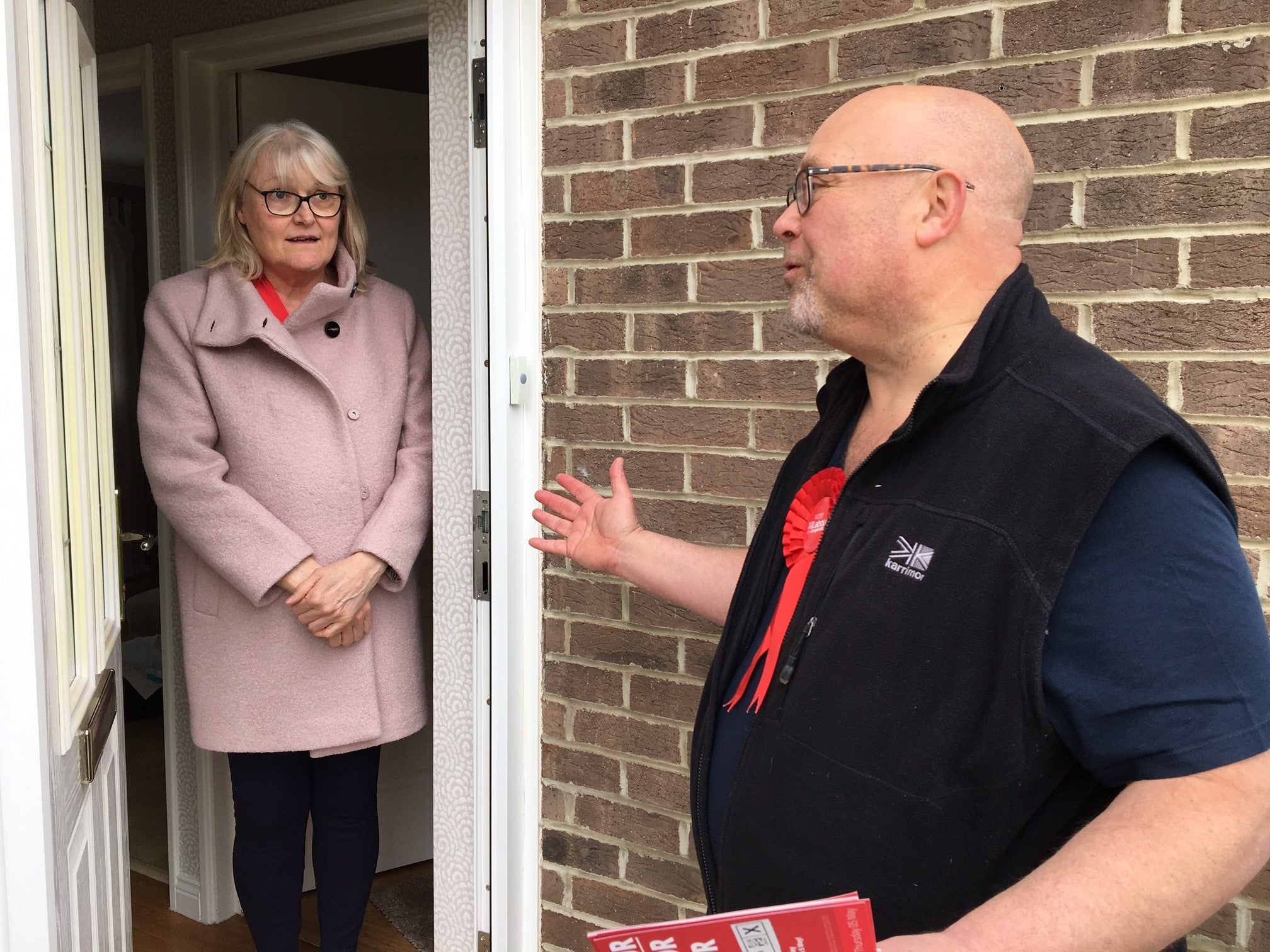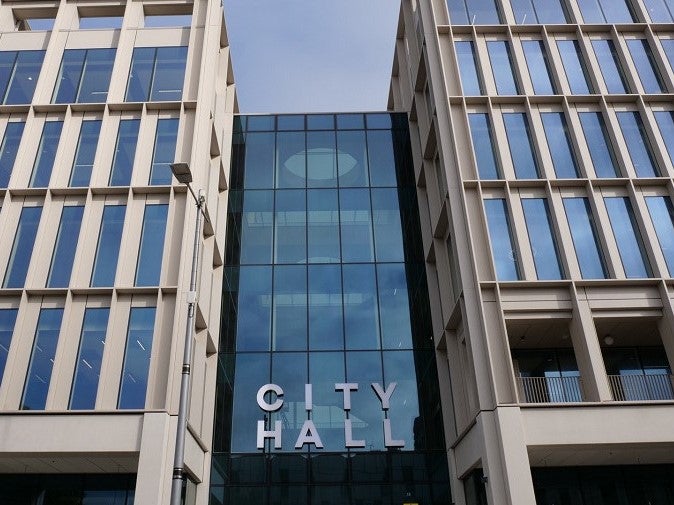
It is a sunny April afternoon in Sunderland and Graeme Miller – the Labour leader of the city council – is hobbling around with a pot on his leg.
A foot infection gone bad has meant the 59-year-old spent the last week door knocking ahead of May’s local elections while in plaster cast.
“People keep asking what happened, and telling me I should be at home resting,” he says. “I say to them I’ve got a vote to win.”
Miller considers the potential electoral implications. “I think it may actually have won me a sympathy vote or two,” he decides. He may need them.
Sunderland has been a solid Labour redoubt since the council was first formed in 1974. In the near half-century since, there has been just three years when the party has not held more than 50 of the available 75 seats. Throughout the 1990s and early 2000s, they had more than 60. It is as red as Red Wall gets.
Yet as polling day looms, there is a growing suggestion the Conservatives – Partygate or no Partygate – could do the once unthinkable and seize control here.
The Tories currently hold an almost unprecedented 19 seats after major gains last year. If they – or any other party – can take just six of Labour’s 43 current seats on 5 May, it would wipe out the red majority and leave both groups scrambling to create a ruling coalition.
For Miller, such a result would mean an end to four years leading the northeast city. For Labour more widely, it would inevitably raise questions over whether the party could win a future general election and how far it had come under Sir Keir Starmer’s two-year tenure.
“We have to be very cautious in extrapolating national conclusions from local council elections,” says Matthew Flinders, professor of politics at the University of Sheffield. “But if Sunderland did fall out of Labour control – especially given the current political climate – I think we could categorise that as catastrophic for the party.”
On a warm Thursday afternoon out canvassing in his own ward of Washington South, Miller – who is up for reelection – remains confident such a doomsday outcome will not happen.
“I keep reading the Tories saying they are going to [take control],” says the one-time charity chief executive. “I don’t know where they’re getting their information from but it’s not the doors I’m knocking on. You don’t take anything for granted but I’ll say this: what’s going on [in Westminster] is doing our job for us. There’s hidden anger out there.”

This, then, is Partygate – and it’s worth addressing.
Certainly, there appears to be some – though by no means complete – fury about the fact Boris Johnson broke coronavirus lockdown laws to attend a series of illegal parties at Downing Street. One door-stepped voter, 66-year-old Phil Cave, tells Miller there is one main reason he wouldn’t vote Conservative. “I’ll give you a clue what it is,” the retired engineer says. “He’s got blond hair and a police fine.”
Yet to what extent this anger will feed into the outcome on 5 May is a contested point.
“Inevitably,” says Dr Antony Mullen, the 30-year-old leader of Sunderland’s Conservative group, Partygate will cost his group some votes here. He himself has repeatedly called on Mr Johnson to resign because of the scandal.
But he is adamant that voters here know a council election is not a referendum on the prime minister’s conduct. Local issues, he says, will decide the day.
He draws attention to an application to build a KFC in his own ward of Barnes, which, at the time of writing, has not made the front pages of any national newspapers. “People here are absolutely aghast at it,” he says. “Far more so [than Partygate]. And this might not make for an easy national narrative but that will have a far bigger impact on how people vote than Boris Johnson’s behaviour.”
Pertinently, he reckons, internal party polling has shown that voters are moving to blue: they want a greater diversity of opinions on the council. “They don’t just want a red block anymore,” he says.
If that’s true – and there is evidence on the doorstep to suggest it is – then, undoubtedly, it adds to the idea that Sunderland may be up for political grabs.
This is a city that has seen much progress of late. Professor Lawrence Bellamy, dean of Sunderland University’s faculty of business, law and tourism, says it is going through its “most sustained period of development in decades”.
Nissan has announced plans for a new £1bn electric vehicle hub here while new hotels and cultural spaces – including a live music venue in a former fire station – have all sprung up. Just last month, the council officially opened a new £42m City Hall on an old brewery site that had stood empty for 20 years.
Yet, in spite of such green shoots, this is also a city that is in the top 20 per cent most deprived in the country and which, ultimately, appears to increasingly feel the Labour monopoly may not always have served it well. A joke has done the rounds that it is appropriate the new City Hall is on the site of a brewery because, so it goes, the city’s councillors couldn’t organise a… well, yes, you get the gist.
Miller himself is the first to acknowledge such criticism. “We took Sunderland for granted for 30 years,” he says. “We haven’t done enough with the power we’ve had… Well, that’s the past. I’ve spent four years rebuilding trust.”

Perhaps because of the closeness of the race, this year’s campaigning has been vicious and, at times, not entirely clean.
Mullen is not above getting personal. He describes Miller as having a “grin like a Cheshire cat” and has previously suggested some Labour councillors look “ready for retirement”. He has no apparent issue in making political capital of the fact two Labour members have been convicted of child sex offences in the last three years.
Yet Labour, for its part, has put out leaflets containing verifiable falsehoods. One suggested Mullen – who, like Miller, is also up for reelection – lived and worked in Bolton. He does neither. He lives, works and, for good measure, was raised in his own Barnes ward.
When Miller is asked about this, he shrugs it off. The party had thought the leaflet was accurate when they had published it, he says. A party member out campaigning appears affronted by the suggestion of wrong-doing. “They do just as bad,” she says of the Tories.

Now, with more than a week to go, the campaigning – and mudslinging – looks only set to grow. Yet ultimately it is perhaps people like the smiling Diane Blanckley who will decide the outcome in May.
The retired teacher answers the door at the last house Miller knocks at in Washington. She is a floating voter who went for Johnson in 2019 but has an instant smile for the council leader.
Twice in the past 10 years he’s helped her sort different issues out – one with a planning dispute, one with a school. She thanks him once again, and then – inevitably – asks about his pot. “Look after yourself, love,” she says.
Can I count on your vote, he asks. He certainly can, she replies. “For everything you’ve done,” the 63-year-old adds.
It is a response that, in fact, may capture something important.
In Sunderland – and elsewhere – old tribal loyalties appear less and less significant in local elections. Of increasing importance, it feels, is the quality of the service that individual councillors offer their communities; of the help they provide to those experiencing problems; of the sheer hard graft they put into the role.
It may, as Mullen says, make for no easy national narrative.
But it does suggest that, whatever happens in Sunderland on 5 May, this city may never again be a red – or any other colour – redoubt.







